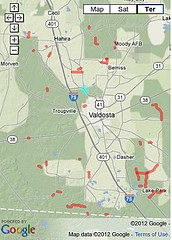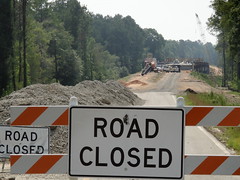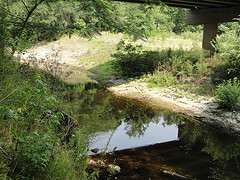We’re on Georgia Water Coalition’s Dirty Dozen 2011: as 9. South Georgia Wetlands: Four Decades of Ditches Dry Out South Georgia Wetlands:
Since the 1970s, state and federal regulatory agencies have allowed the destruction of more than 200,000 acres of highly critical wetlands throughout South Georgia to increase timber production and agricultural yields and usher in residential and commercial development. These wetlands that captured water and slowly released it to streams no longer perform that important function. The result has been increased floods when it rains and record low flows when it doesn’t….
Flooding? Like the 700 year flood in Lowndes County 3 years ago today?

What’s a wetland, anyway?
the greatest concentration of wetlands is in the Coastal Plain of South Georgia. Though these forested foodplains and wetlands may not seem directly linked to our rivers and streams, they play an important role in holding water during rain events and dispensing it during dry periods. The sponges and kidneys of our state, they mitigate major floods, lessen the impacts of drought, and clean the water that passes through them, while regulating the amount of freshwater entering Georgia’s coastal estuaries where commercially important seafood find critical habitat. Additionally, these wetlands provide important habitat for waterfowl and other wildlife.
So what’s the problem?
In an effort to convert these wild lands into
“useful” acreage, property owners have “ditched” their land to carry water to nearby streams rapidly and keep the land dry. Many of the major wetland systems and streams have themselves been channelized using vast federal and state tax resources. Once converted the property has been employed in agriculture, silviculture and commercial and residential development. The cumulative impacts have been catastrophic.
Let’s see, Lowndes County has had to rebuild the bridge over the Withlacoochee on Skipper Bridge Road,
 Valdosta is still repairing damage from that flood three years later, plus plus for more recent flooding, including flooding on Country Club Road
Valdosta is still repairing damage from that flood three years later, plus plus for more recent flooding, including flooding on Country Club Road
…excess rain which overloads the Withlacoochee River Water Pollution Control Plant. He said growth along the river and throughout the regional watershed area has contributed to the amount of excess water running into the river.
That’s just obvious damage to human-built structures. There are many more water concerns in the general area.
Back to the Dirty Dozen:

High flows on many South Georgia streams have increased by 25 to 35%, generating record and near-record flooding during rain events that would previously produce only minor flooding.
So that 700 year flood probably won’t take 700 years to happen again.
Meanwhile, low-flows periods have been worsened by as much as 90%. Small streams dry up during the dry periods of even the wettest years and main river channels have become creek-like.
Like the Withlacoochee Trickle last June.
What is to be done?
To prevent the continued destruction of Georgia’s remaining wetlands, the Corps must administer its permitting program properly and enforce the laws protecting these wetlands. Furthermore, federal investments in wetlands restoration must continue and Georgia must find ways for property owners to preserve and restore wetlands.
The Corps must improve evaluation of permit applications to ensure that wetlands have been identified properly. Additionally, the Corps must ensure that when wetlands are altered and destroyed, the permit applicant must provide adequate compensation by improving or creating wetlands nearby.
Further investments in U.S. Department of Agriculture’s Wetlands Reserve Program should be made to allow property owners to voluntarily restore wetlands.
At the state level, Georgia should investigate programs that help property owners preserve and restore wetlands as recommended in several regional water plans.
And how about counties and cities stop permitting destruction of wetlands such as the cypress swamp Lowndes County let a developer cut down on Val Del Road? (More on that one later.)
-jsq
PS: The presentation pictures are from Georgia River Network’s Weekend for Rivers last weekend. I’m pretty sure that’s Juliet Cohen, General Counsel for Upper Chattahoochee Riverkeeper. More on that conference later.
Short Link: